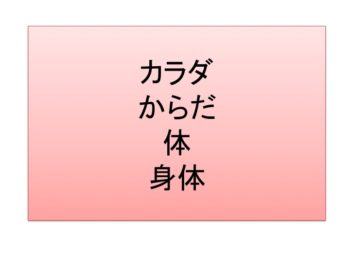Variety Makes Life Richer – Writing System Posted by eriko1 on Aug 27, 2021 in Culture, Kanji, Language, Slang
Like many people in the world, I started playing Animal Crossing New Horizon on a Nintendo Switch that my son had brought back from Kyoto. It was extremely hard to get one in the US or Japan due to the very high demand (需要 jyuyo), so that was great. The great thing about the Switch is that you can change the language (言語 gengo) setting depending on a player. So I can play Animal Crossing in Japanese, while my son plays it in English, and I can compare the two languages how translation was done. It is extremely interesting to compare, and the translation is very well done except for some cultural parts – like why Tsunekichi (Rhed) speaks in Kansai dialect (関西弁 kansai ben. )
Who was the target player of this game? Some may say, it was for kids. However, when you listen to some remarks that characters make, it is obvious that it is not strictly for kids. It is important to point out, however, that the Japanese are more lenient with (〜に寛大な kandaina) remarks with sexual connotations. Look at some children’s manga or anime, for instance. So this may target the family. Children enjoy it in their own way, while adults can laugh at subtle jokes.
What interested me most is the use of katakana and hiragana. When teaching Japanese, especially to beginners, it is taught that katakana is used mostly for borrowed words from foreign languages. For instance, テレビ (terebi, television)、コンピューター (computer)、ハンバーガー (hamburger), and so forth. However, how many times have you seen these words intentionally written in hiraganaてれび (terebi, television)、のーと (no-to, notebook)、 みるく(miruku, milk)? Japanese use katakana, hiragana, and kanji rather freely (自由に jiyuni) to express certain feelings. When we see てれび instead of テレビ, we tend to get a feeling of nostalgia (懐かしさ natsukashisa) even though テレビ has always been テレビ as it is a borrowed word from English.
Let’s see some examples in Animal Crossing.
キホンなんでもやるけど いま アツイのは 剣道だな (I basically do anything, but what is hot right now is kendo.)
いま、アイドル修行のイッカンで チアダンス練習してるんだー (As a part of training to be an idol, I practice cheerdance.)
マジでー?(Are you kidding?)
モウソウっていうんじゃない? (Isn’t it a delusion?)
もう ミスズちゃんたら セーロンばっかいって (Oh, Misizu, you only make sound remarks)
オイシイ水 おかわり〜 (Want another serving of tasty water!)
ブレない性格だなーって (unflinching character)
わかりすぎて ヤバイー!(I get it so much, unbelievable!)
ホントにさー (Really)
シットしてくれてるのかい? (Are you jealous to please me?)
今、ステキなこと 言わなかった? (Didn’t you just say something awesome?)
Highlighted in RED are words NOT normally expressed in katakana. So why is katakana used instead of hiragana or kanji? The remarks above use katakana to show that the speakers are young and hip (ヒップ、カッコいいhippu, kakkoii).
Rakusul, an online design/printing company, characterizes the 3 writing styles as follows.
Hiragana: easy to read for everyone, thus it shortens the distance between a receiver and a sender of information. However, overusing (使い過ぎ tsukaisugi) hiragana will make it difficult to read and may make people think you do not know kanji.
Katakana: used to write what hiragana cannot, such as borrowed words from foreign languages. At the same time, you can add vibrancy (躍動感 yakudoukan) by using katakana instead of kanji or hiragana.
Kanji: In a formal writing, kanji characters are certainly appreciated, but only to a certain extent. Too many kanji characters will make readers lose interest.
Rakusul further points out that using only one katakana word in a sentence will get readers’ attention, but using katakana for words that are usually not written in katakana requires a high level of cultural understandings.
Having three writing characters is painful for learners of Japanese, but these characters make it possible to express a wide variety of feelings and thus make your writing richer.

Build vocabulary, practice pronunciation, and more with Transparent Language Online. Available anytime, anywhere, on any device.





Comments:
Claudia:
Very interesting! Old American cartoons (like the Flintstones and Jetsons) also included comments for adults (but not sexual ones). Another weird linguistic thing is that often the main (male) character had a strong NY working class accent. Never sure why…